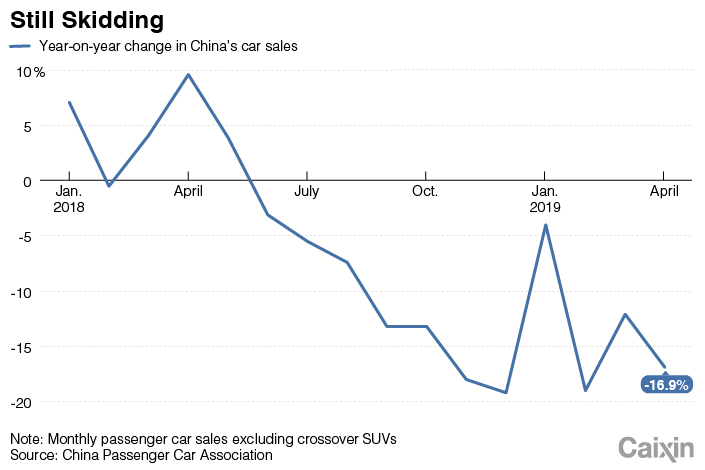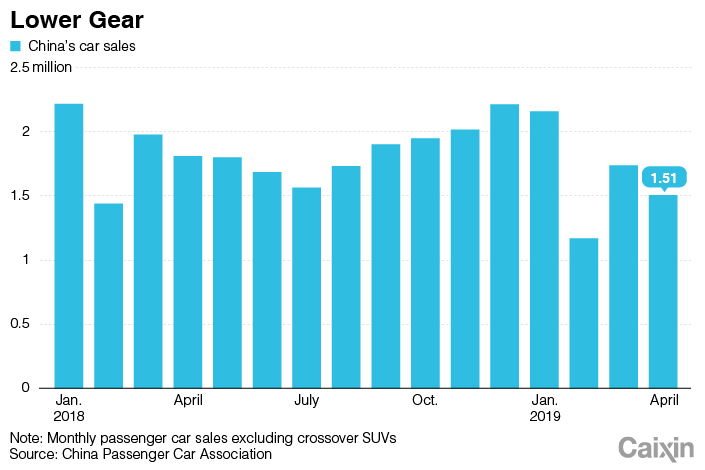China’s Car Sales Keep Slowing in First Four Months
China’s auto sector extended last year’s declines in the first four months of 2019, with little indication a turnaround is on the horizon.
For the first four months, total sales of passenger vehicles fell nearly 12% to about 6.6 million, according to the latest figures from the China Passenger Car Association (CPCA). April saw a 17% year-on-year decline to just 1.5 million vehicles, the industry association’s data showed.
 |
Even China’s industry leaders are feeling the chill. SAIC Motor Corp. — the country’s largest auto group — sold about 2 million vehicles in the period, a drop of 16.8% year-on-year. Chongqing Changan Automobile Co. Ltd., one of China’s “Big Four” carmakers, saw its sales fall 35% to 441,000 units.
Last year was a watershed moment for China’s auto market, as it posted its first annual decline in more than two decades. Passenger car sales in the world’s biggest market fell 6% to 22.7 million units for the year, according to CPCA.
Beijing has rolled out incentive policies designed to prop up sales since the start of this year. In a January document published by top economic planner, the National Development and Reform Commission (NDRC), promoting car sales in rural areas was listed as one of the major measures to battle China’s economic slowdown.
This package of policies, which included a 3% cut to the corporate value-added tax in March, is yet to have an obvious effect on the sector. The tax cut — which should have been a boon to the auto industry — unexpectedly triggered tougher price competition among carmakers, hurting their revenue, Jiang Zili, a vice general manager at major state-owned automaker BAIC Group, said at an industry forum on Saturday.
Also, the ongoing trade dispute between China and the U.S. has cast further doubt on the industry’s prospects. Last week, Washington announced it would increase the punitive tariffs on $200 billion worth of Chinese products to 25% from 10% after the two sides failed to seal a trade pact. Beijing later promised to retaliate.
 |
If China decides to further raise its tariffs on imported products from the U.S., which already include automobiles and other car parts, the sector would feel a “negative influence,” said Xu Changming, a vice president at the NDRC-affiliated State Information Center, at the Saturday industry forum.
Xu however predicted that the market will bounce back in the second half of the year. He predicted that China’s auto sales for the entire year will post “small growth” — or at least remain the same as last year.
Contact reporter Mo Yelin (yelinmo@caixin.com)

- 1Cover Story: China Carves Out a Narrow Path for Offshore Asset Tokenization
- 2Drownings Shake Chinese Enthusiasm for Travel to Russia
- 3Over Half of China’s Provinces Cut Revenue Targets
- 4Li Ka-Shing’s Port Empire Hit by Forced Takeover Amid Panama Legal Dispute
- 5In Depth: China’s Mutual Fund Industry Faces Overhaul After a Banner 2025
- 1Power To The People: Pintec Serves A Booming Consumer Class
- 2Largest hotel group in Europe accepts UnionPay
- 3UnionPay mobile QuickPass debuts in Hong Kong
- 4UnionPay International launches premium catering privilege U Dining Collection
- 5UnionPay International’s U Plan has covered over 1600 stores overseas





